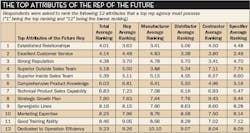A “sea change” is a significant and systematic transformational change in the environment. The three sea changes now disrupting the electrical channel are digital sales technology, the evolution of the employee workforce and consolidation. Smart reps and manufacturers will embrace these three sea changes as constructive disruptions and capitalize on the opportunities they present.
Digital sales technology. Unprecedented growth in the business-to-business (B2B) e-commerce market over the next five years will improve efficiencies, lower costs and provide deeper insights into customer trends. The digital world and enriched data is taking websites from informational to transactional. Electronic Data Interchange (EDI) will finally be widely adopted. Vendor-managed inventory (VMI) will electronically streamline inventory management, while order-fulfillment functions and online sales will increase speed and accuracy of order processing. Technology changes in the electrical channel are going to continue to impact both how NEMRA reps and manufacturers go to market and how they serve specific market segments. Increasingly, face-to-face interactions will be both replaced and enhanced by transacting business online. This technological transformation will require a continuous-investment mindset that will test NEMRA reps in the electrical channel. Smaller NEMRA reps will have a real challenge keeping up and delivering competitive technology solutions for their customers.
Acquiring and implementing digital sales tools and hiring the employees who know how to best use them will be a key challenge for reps over the next few years. Survey respondents told us reps with greater digital capabilities will be more desirable business partners. And due to market globalization and constant access of information, reps can boost their value by becoming better managers of information rather than just moving information along to manufacturers.
Another trend that emerged on the digital front has been the slow adoption rate of CRM (Customer Relationship Management) systems between manufacturers and reps. Manufacturer CRM systems have been a major burden on the rep community as manufacturers have not demonstrated a willingness to work outside of their own CRM tools. This is likely not to change over the next five years unless reps can build a seamless bridge to their numerous manufacturers’ CRM systems. Those reps that can find a CRM tool that can build data bridges to their multiple manufacturers’ CRM systems will have a significant resource advantage in the marketplace. In part 2 of this excerpt we will discuss some of respondents’ experiences with NEMRA’s CRM system.
Multi-generational workforce. This digital transformation leads to our next sea change. Over the next five years, there will be four generations in the workforce, and Baby Boomers will only make up 23% of the workforce. An estimated 77% of the workforce will be made up of Generation X (the 20% of the workforce born 1965-1980); Generation Y (the 50% of workers born 1981-2000); and Generation Z (the 7% of workers born after 2000).
Baby Boomers still make up most of the current electrical channel leaders among NEMRA reps and manufacturers. The front end of the Baby Boomers will be 72 years old in 2018 and the last of the Baby Boomers will be age 56 in 2020. Generations X, Y and Z will be charged with moving the electrical channel forward. The Millennial generation (18-33 years old) will constitute 75% of the workforce within 10 years by 2025.
To attract talented Gen X, Millennial and Generation Z (Net Generation/Digital Natives), NEMRA reps and manufacturers will have to create organizational cultures that support change, empowerment, collaboration, recognition and technology. This will be a bigger challenge for NEMRA reps than manufacturers. The Millennial workforce is changing how we operate, in large part because technology has made a prominent impact on all aspects of the lives of those workers in Generations X, Y and Z since they were born. One key element of this sea change that reps will have to manage carefully is that the next generation will research data and product attributes digitally rather than through traditional means like paper catalogs and cut sheets. The rapid advancements in technology will create new jobs with reps that require new skill sets and attract younger, tech-driven employees to the electrical channel.
Electrical channel consolidation. Consolidation of electrical distributors and electrical manufacturers will continue over the next five years because most privately-held electrical distributors and manufacturers are available for the right price. Super-regional and national chain electrical distributors continue to be on the hunt for strategic geographic fits, aging owners and weak management succession plans. Mid-size, large and platform manufacturers continue to look to grow their product baskets.
Many manufacturers are taking a real close look at their rep force and will only go to market with reps built for the future. They want reps with consistent management teams with good succession plans, and who are willing to invest in digital technologies.
As a result of this continued channel consolidation, almost every electrical manufacturer, distributor and rep we interviewed believes NEMRA will have significantly fewer traditional rep firms within the next five years. Some manufacturers and distributors who responded to the survey said many territories have weak rep agencies unwilling to invest in the right technologies or the right people, or don’t have their organization designed properly. Owners of these rep firms, they said, are harvesting their incomes, not reinvesting in their agencies.
Manufacturers have been approaching large and mid-size reps to look at these strategic geographic targets and acquire these aging agencies with weak management succession plans. Some platform manufacturers are replacing their smaller, weaker independent manufacturers’ representatives with stronger, larger reps.
Additionally, there is nearly universal agreement from the electrical distributors we talked with in our telephone research that there will be fewer traditional rep firms in the future. Respondents said the biggest threat for any rep firm from the manufacturer’s point of view is for the rep to be singularly focused on “what they have to kill to eat every day” and not having a well-defined and supported long-term business strategy that provides continuous and significant value to their manufacturers. Reps that do not have a cohesive long-term business strategy that provides continuous and significant value will not represent top-tier manufacturers five years from now.
Smaller commodity reps will be vulnerable if the products they represent can be purchased online through alternate channels, i.e. Amazon, Grainger, Home Depot, etc. Smaller specification reps will still have a position with non top-tier manufacturers. However, even these reps will have to invest in digital sales tools and a multi-generational workforce to survive into the future and to hold onto their lines. You may also see reps from adjacent market segments such as lighting, data communications, automation and controls, power quality and utility, move into the mainstream electrical market, and NEMRA may add many of these reps as members.
For electrical manufacturers, any move toward consolidation will come with a need for specialization on the part of reps, and the FCG survey results point toward a big increase in reps’ specialization and technical competency over the next five years. Because some manufacturers’ cost-cutting measures will likely lead to reduced factory-direct technical resources, more of them will look to reps to fill these technical expert field roles.
In this case, the rep will often hire the former manufacturer’s direct salespeople as technical resources, and manufacturers will retain some personnel to act as the local technical resource in a hybrid sales organization structure.
Since our last NEMRA “Rep of the Future” research study in 2009, key leaders from electrical manufacturing and distribution have joined leading manufacturers’ representative firms, often bringing these reps greatly expanded technological insight into their product packages. Here are some examples of the manufacturers and distributors who made this move:
- AJB Sales: Jeff Carden from Leviton
- Allied Group Sales: Tim Klei from HD Supply
- ElectroRep: Dean Pournaras from Legrand/WattStopper
- E-Tel Sales: Randy Ribbing and Kyle Ribbing from Eaton
- Gorin Hopper McCoy: Nate Decker from Graybar
- JD Martin Co.: Jeff Anderson from ABB
- Lester Sales: John Scott from Kirby Risk, Rick Gill from Crescent Electric Supply and Kevin Wood from Philips
- One Source Associates: Bill Tucker from Rexel
- RB Sales: Bryan Hadley from Littelfuse
- Synergy Electrical Sales: Hagen Denton from Lutron
- Yanow Companies: Tracie Kacmarcik from Osram Sylvania
- Yusen: Barry Wolff from Rexel
The acquisition of this level of managerial talent by reps will continue over the next five years. With continuing consolidation, more agency executives will likely come from manufacturing with the added incentive for a rep firm to lock up a line with their manufacturers’ approval.
Another possible outcome of this industry consolidation is that smaller to mid-size manufacturers will look for their reps to cover larger geographical territories, in efforts to counteract platform manufacturers. Super reps could be formed by packaging lines such as Lutron, Arlington, ILSCO, Mersen, BRK, RAB, American Fluorescent and other independent (not part of one of the electrical conglomerates) non-competing lines — if these or other smaller to mid-size manufacturers themselves are not acquired by platform manufacturers.
What reps of the future may look like. Respondents helped FCG sketch out a profile of the most desirable business attributes for the reps of the future. We asked respondents to rank 12 distinct attributes with “1” being the top ranking and “12” being the lowest ranking. The results are in the table below.
Rep respondents believed having established relationships and a strong reputation were the most important attributes, while manufacturers said having established relationships and a superior outside sales team are the most important. Distributors believe providing excellent customer service is the most important attribute. Electrical contractors agreed on customer service, along with established relationships, while specifiers said providing excellent customer service and having comprehensive product knowledge were the top attributes.
Part 2 of this excerpt of the 2015 NEMRA Rep of the Future white paper will discuss these attributes in more depth and explore the future market dynamics that we believe will reshape the electrical channel.
To discuss the results of this report in more depth, or to receive a copy of it, call Farmington Consulting Group at 860-678-4402 or email Tom ([email protected]) or TJ ([email protected]).
About the Author
Thomas O'Connor
President & Founder
Tom O’Connor started Farmington Consulting Group, Farmington, Conn., for the distribution channel in 1982. He is nationally recognized in the distribution industry as a strategy consultant. O’Connor is also a contributing writer for Electrical Wholesaling and a best-selling author for the National Association of Wholesaler-Distributors (NAW) with his book, “Strategic Planning for Distributors: Execution Isn’t Everything – It’s the Only Thing!”
TJ O'Connor
Director of Research
TJ O’Connor leads FCG’s distributor market research practice and is the firm’s vice president. TJ is an expert in conducting and analyzing distribution industry benchmark surveys, customer satisfaction surveys, sales channel effectiveness surveys and competitive profiling.


